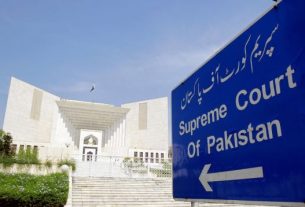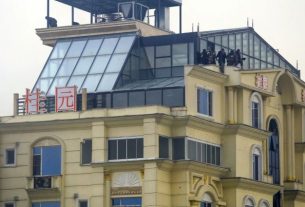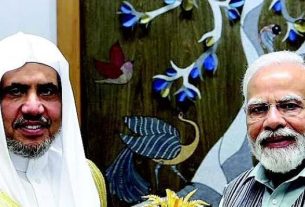ISLAMABAD: Chief Justice of Pakistan (CJP) Qazi Faez Isa underscored the Supreme Court’s resolve on Tuesday to conclusively address the issue of missing persons and enforced disappearances, and said that it should be solved “once and for all”.
However, he cautioned against politicising the matter. “We cannot grant you permission to make the matter political.”
Earlier today, Baloch protestors announced a shutter-down demonstration for tomorrow (January 3) across Pakistan, stating that government officials have been trying to label the Baloch Yakjehti’s Committee’s (BYC) long march and demonstration in Islamabad as ‘propaganda’.
The hearing was presided over by CJP Isa with Justice Musarrat Hilali and Justice Muhammad Ali Mazhar completing the three-member bench. The proceedings were broadcast live on the apex court’s website and national news channels.
As the hearing commenced, Justice Isa emphasised the importance of collective responsibility, the CJP said “This country belongs to all of us, even those who may have other points of view”.
“This matter will only be resolved when we all work together and take responsibility. Let’s make Pakistan strong from within. If Pakistan is strong from within, no outside forces can touch it.”
Petition Khushdil Khan Malik prayed to the court for instructions to the government to enact legislation on the issue of missing persons. Justice Mazhar stated that a commission related to enforced disappearances has been formed.
The petitioner argued that the Commission of Inquiry on Enforced Disappearances was formed under the chairmanship of Justice (retd) Javed Iqbal, but has not made much headway so far. He further prayed that a notice should be issued to the government regarding its lack of action in enacting the said legislation.
The chief justice observed that the court does not have the authority to order the parliament to enact legislation and inquired under which article of the Constitution can the court take such a step. He maintained that all institutions of the country need to stay within their constitutional limits.
Justice Mazhar added that the court does not have the power to legislate and can only declare enacted legislation null and void if they are contrary to the Constitution.
When former senator Aitzaz Ahsan’s lawyer, Shoiab Shaheen took the rostrum, the CJP stated that he was not Ahsan’s council, to which Shaheen stated that as Latif Khosa’s son was under arrest, he had been given the power of attorney.
The CJP then remarked that he is hearing the petitions after dismissing objections as it is a matter of public interest and added that there were developments in his absence, hence the petitions were fixed for hearing as soon as he returned. The CJP was likely referring to the Baloch long march which faced a brutal police crackdown as it attempted to enter the federal capital to hold a sit-in for the recovery of missing family members.
Raising reservations against the commission of inquiry, Shaheen said that it has not worked effectively. When asked which government was in power when it was formed, he was told it was formed in 2011 under the PPP government’s tenure.
The CJP then remarked that Ahsan was himself part of the PPP, and does he want to suspend the notification for the commission’s formation. Shaheen replied that according to the commission, 2,200 people were still missing.
The counsel then raised the issue of the disappearances of AML chief Shiekh Rashid, Sadaqat Abbasi and others. CJP Isa asked if all the individuals mentioned by the counsel had become petitioners to the case. and if not, why was the counsel trying to politicise the case.
The CJP maintained that the apex court is approaching the issue with utmost seriousness and the court would not be used for political purposes as the counsel named individuals from a single political party.
Shaheen then shifted the argument to a bill presented by then-human rights minister Shireen Mazari, which allegedly went missing. When Justice Isa asked if Mazari then resigned in protest from the ministry and added that the issue originates from the fact that when people hold office, no individual takes responsibility.
CJP Isa further stated that the counsel should also make Chairman Senate Sadiq Sanjrani a party to the petition since hi mentioned the ‘missing’ bill. The counsel replied that he did not possess a copy of the bill when the bench asked to see it.
Referring to the mention of missing journalists, a point earlier raised by Shaheen, the bench asked if Imran Riaz was still missing and inquired if he was not an influential individual. The court also asked why the names of Matiullah Jan and Asad Toor were not mentioned.
The bench also asked the counsel if he had prepared a list of names of missing individuals according to the dates they were reported missing.
Referring to the commission again, the CJP asked if the petitioner’s counsel was satisfied with Justice (retd) Javed Iqal heading the commission.
To which, Shaheen replied that they would like a new commission formed along international standards. Maintaining that a solution will be found to the issue of missing persons, the CJP said the court can only hold the interim government responsible for people who went missing during its tenure.
The hearing was then adjourned till January 3.
Baloch protestors have announced a shutter-down demonstration
The BYC said that the “state has continuously shown a half-hearted and uncommitted concern regarding our demands since the inception”.
“Therefore, on January 3, we are calling for a shutter-down demonstration. We urge people from all segments of life to advocate and respect our call for the shutter-down strike in the name of humanity and the Baloch nation, aiming to preserve our identity”.
On December 28, the Baloch protestors gave the government an ultimatum of seven days to fulfil their demands. The BYC, which has been camping outside the National Press Club, demanded that protestors arrested by the police be released, the abolition of extrajudicial killings and enforced disappearances, a detailed investigation into the violation of rights in the province, restrictions on the Counter-Terrorism Department (CTD) and the elimination of ‘state-sponsored death squads’.
Dr Mahrang Baloch, one of the organisers of the protest, said in a video statement that the protest had started after a Baloch youth was allegedly killed in the CTD’s custody.
“Our movement is against the decade-long enforced disappearances and assassinations of innocent civilians in Balochistan,” she said and stated that Balochistan residents were in support of the protest.
Recalling that the Islamabad police had used force to ‘sabotage’ the long march and the registration of various other ‘false’ first information reports (FIRs) against protestors across the nation, Dr Mahrang claimed: “We have repeatedly been told by the administration that they are not ready to work on their policy of Baloch genocide”.
She maintained that more than 20 Baloch youths have disappeared ‘once again’. She demanded that those who are languishing in illegal custody be presented before the courts and be given the right to a fair trial.
The call for a shutter-down demonstration comes after interim Prime Minister Anwaarul Haq Kakar said that the issue of Baloch families from Balochistan was being projected in a negative light as 98% of Baloch people were standing with the state of Pakistan.
While responding to different media queries during his visit to the Business Facilitation Centre (BFC) in Lahore yesterday, the prime minister said that terrorists and armed militants had been involved in the killing of people of Balochistan.
“They are killing doctors, lawyers and teachers,” he added.
Dr Mahrang, responding to the caretaker PM on social media platform ‘X’ (formerly Twitter), said that the protesters’ “demands have been clear: an end to all forms of human rights violations in Balochistan and the cessation of the Baloch genocide. We’ve presented these demands to the state through the media”.
She further lamented that the world is witnessing the consistent irresponsibility and stubbornness of the state, where peaceful protestors endure torture and arrests, and media trials are conducted against this peaceful movement”.
“Today, the Prime Minister of Pakistan declared victims of enforced disappearances as terrorists, insulting victim families and addressing peaceful political activists in a threatening tone. However, we assert to this state and government that we will persist in informing the world about your oppression and barbarism,” Dr Mahrang stated.__Tribune.com





